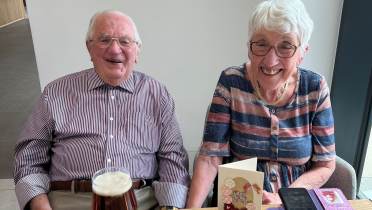On Monday 15th May I had the pleasure of meeting with Mr John Fieldsend at Mayfield Watford. He kindly invited me to his home, and we spent the first few minutes getting to know each other a little. I knew from the offset that I was going to leave our time together feeing blessed and humbled at what I was about to be told.
Once we were sat comfortably, Mr Fieldsend started to talk to me about his early years; lovely memories he had of his mother and father, his older brother & dog. Born in Czechoslovakia in 1931, he moved to Dresden, Germany when he was very young. He shared with me the times he spent outside in the snow, sledging in the hills and happy times he spent playing with his brother and friends.
His family were not particularly religious, and Mr Fieldsend couldn't recall ever visiting a synagogue; he recollected that he knew more about Easter and Christmas traditions than Jewish ones. However, this warm and loving family life started to be affected by being on the receiving end of Antisemitism.
Mr Fieldsend told me about the time he and his father were having a tickling fight and he hurt his head. His father took him to the doctor and was told that he required stitches, however the doctor didn't "stitch Jews" so he was given a plaster. He still has the scar to this day.
His friends also started to turn against him, calling him and his brother names. Family friends turned their backs on them as the Nazi presence increased. The school allowed for the Jewish children to be taunted and bullied, it being written into their policy that it was encouraged to be unkind towards the Jewish students. As life became harder and increasingly more dangerous for the family in Germany, they moved back to Czechoslovakia and stayed with his beloved grandparents. Together the family had a few peaceful months, but this didn't last for long as the Nazis invaded Czechoslovakia and it became dangerous for them to live there too.
Selflessly, Mr Fieldsend's parents decided to send him and his brother over to Britain on Kindertransport as that's where they knew their children would be safe. Mr Fieldsend told me that his father told him some British words to help him once he arrived in Britain. One of these phrases was “I can’t speak English”. His mother gave him her wristwatch as a token for him to remember her. At this point I thought about my own daughter - she is 5 years old, the same age as Mr Fieldsend when he left his home country to come to Britain. I couldn't imagine having to do this and thankfully it was only a horrendous thought for me, not the actual reality as it was for his parents.
It was only years later that Mr Fieldsend found out he owed his place on the transport to Nicolas Winton, who saved over 600 children from Nazi persecution. Nicholas Winton | The National Holocaust Centre and Museum Before arriving to Britain, he spent a brief time at a Jewish boarding school in Hanover.
He arrived in Britain in 1939 and went to live with a foster family in Sheffield; his brother stayed at another foster family nearby. He told me of the lovely life he had with his foster family, and how he stayed with them throughout his education until he married in 1961. He spoke of how they supported his education and helped him with his English; astonishingly he learnt to speak English in 10 weeks! He had also completely forgotten the German language during this time.
Following the war, in 1946 Mr Fieldsend and his brother received 3 photo albums that had been retrieved by the Red Cross from his family home in Czechoslovakia. Alongside his brother he was able to relive the happy memories of his early childhood and see his much-loved family again in pictures, especially as he never dreamed he would see them again. He was also pleased to see that the images he and his foster parents had sent back to his parents of him, and his brother were put lovingly into the final photo album. Knowing that his parents saw that they arrived safe in Britain and were happy must have meant the absolute world to all of them and confirmed that their selfless decision to save their children had proved a good one.
Sadly, for Mr Fieldsend, he also found out that his parents had been deported in 1943 to Poland, where they likely met their fate, alongside his much-loved grandparents.
Mr Fieldsend went on to live a full and happy life, but the scares of what happened in his early childhood are very much there, both physically and mentally. He chose to share his story with many people over the years and continues to do so now. He told me he had a Zoom session with a local school the next day.
Here he is pictured on his apartment balcony at Mayfield Watford.













